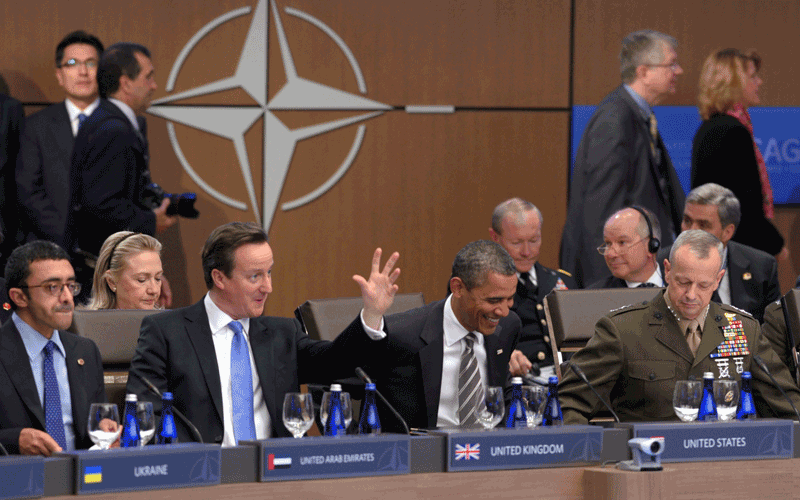NATO leaders will aim Thursday to show unity against Russia over the conflict in Ukraine, after France suspended delivery of a warship to Moscow despite a surprise peace plan put forward by the Kremlin.
Ukraine and the new threats posed by Islamic extremists in Iraq, Syria and beyond will dominate the two-day summit in Newport in Britain, along with a troubled withdrawal from Afghanistan.
NATO head Anders Fogh Rasmussen warned that Russian intervention in Ukraine is the most serious security threat since the Cold War, one which the 28 member states ignore at their peril.
US President Barack Obama and British Prime Minister David Cameron vowed to stand together in support of Ukraine against Russia in a joint statement in The Times newspaper on Thursday.
“Russia has ripped up the rulebook with its illegal, self-declared annexation of Crimea and its troops on Ukrainian soil threatening and undermining a sovereign nation state,” the two leaders wrote in an op-ed piece.
“”We should support Ukraine’s right to determine its own democratic future and continue our efforts to enhance Ukrainian capabilities.”
To highlight support for Kiev, leaders will meet Ukrainian President Petro Poroshenko for a session of the NATO-Ukraine Council, set up after the country became an alliance partner in 1997.
Even before the official start of the summit at 1045 GMT, British Prime Minister David Cameron has called talks with Poroshenko and the leaders of France, Germany, Italy and the United States.
That meeting will “send a clear signal of their support for Ukraine’s sovereignty and that the onus is on Russia to de-escalate the situation,” a British government source said.
Russian President Vladimir Putin on Wednesday pre-empted the NATO summit, unveiling a seven-point Ukraine peace plan to produce a ceasefire on Friday, the day when the European Union is expected to announce additional tough economic sanctions against Moscow.
Putin appealed for both sides to lay down their weapons after nearly five months of fighting that has killed 2,600 people and been blamed by both Kiev and its Western allies on Putin’s attempts to seize back former Soviet and tsarist lands.
Poroshenko said the seven-point peace blueprint was agreed during a phone exchange with Putin.
However, Ukraine Prime Minister Arseniy Yatsenyuk swiftly rejected Putin’s plan as just the latest “attempt to pull the wool over the eyes of the international community”.
The resurgent rebels may also take some convincing to lay down their weapons after scoring a resounding string of successes with the alleged support of Russian soldiers that has seen Ukrainian forces lose effective control over most of the separatist east.
Against this troubled backdrop, the summit centre-piece will be approval of a new NATO rapid reaction force comprising “several thousand troops” that can be deployed within “very few days” to meet any new threats, Rasmussen said.
It will mean “a more visible NATO presence in the East for as long as required”, he said, aiming to reassure jittery allies such as Poland and the Baltic states once ruled from Moscow.
These forces will be rotated through eastern Europe, not based there permanently, in accordance with a key clause in the 1997 NATO-Russia Founding Act which fixed Europe’s post-Cold War borders and prohibited the use of force to change them.
On that count, NATO says Russia’s March annexation of Ukraine’s Crimea territory is in breach of the Founding Act and has suspended virtually all co-operation with Moscow, but Rasmussen has insisted the alliance remains in compliance.
If it were to be abandoned, the uncertainties that many thought settled after the end of the Cold War could well be re-opened, an unsettling prospect for the West.
NATO offered Ukraine full membership in 2008, when Russia went to war against another former Soviet state, Georgia, but in 2010 then president Viktor Yanukovych opted for a “non-bloc” policy.
Yatsenyuk said last week, however, he would ask parliament to endorse a membership bid, a move that would rile Russia, which has requested that Ukraine remain neutral.
Obama on Wednesday urged NATO to send an “unmistakable message of support” to Kiev as Poland announced that Ukraine would host a series of US-led military drills later this month.
The final day of the summit, at which 60 world leaders are expected, could prove particularly testing.
A French diplomatic source said Wednesday that Paris had suspended delivery of the first of two warships to Russia after “listening to pressure”, and would review its decision in November.
The sale — worth a total of 1.2 billion euros ($1.6 billion) — has angered many in the international community seeking to show unity against Russia over its actions in Ukraine.
NATO meanwhile faces a quandary over Afghanistan, where the alliance is due to end its longest ever combat operation this year, but finds it has no government to hand over to as presidential elections have failed to produce a winner.
The alliance also faces the perennial problem of funding.
The US spent some $640 billion on defence in 2013, accounting for nearly 75 percent of all NATO members military expenditure, a burden it believes must be more fairly shared in the future. SAPA






 WhatsApp us
WhatsApp us 

